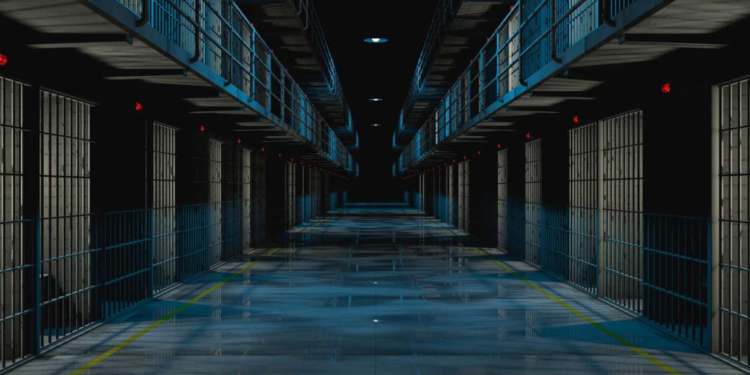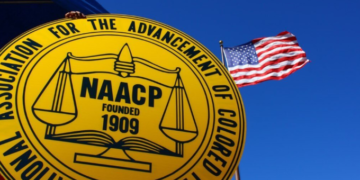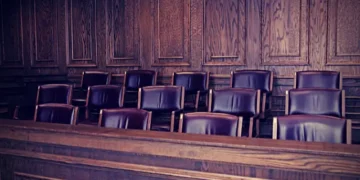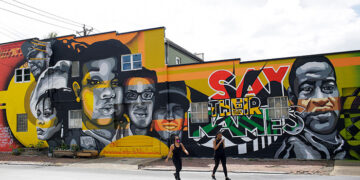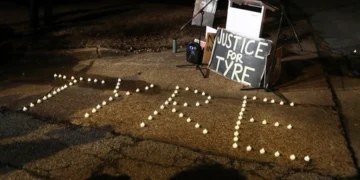Oct 23, 2024 Story by: Editor
As the United States approaches one of the most pivotal presidential elections in recent history, criminal justice reform has surfaced as a potentially decisive issue, with a recent poll showing widespread bipartisan backing for reducing incarceration rates. Conducted by BSG for FWD.us, the survey found that 81% of likely voters support criminal justice reform, with 85% of Democrats, 82% of Independents, and 76% of Republicans in favor. Voters in key battleground states, such as Arizona, Georgia, Michigan, and Pennsylvania, overwhelmingly back reform, suggesting that the issue could play a significant role in shaping the 2024 presidential race.
Zoë Towns, Executive Director of FWD.us, shared the poll’s findings on the Black Press’ Let It Be Known digital show, highlighting that personal experiences with mass incarceration drive voter support for reform.
“Voters across the political spectrum have been overexposed to the harms of mass incarceration for decades now,” said Towns. “One in two Americans has experienced incarceration within their immediate families—this isn’t just a policy issue, it’s a lived experience. And the exposure rate is the same whether you are a Republican or a Democratic household.”
Towns emphasized that this shared experience explains why criminal justice reform resonates with voters across party lines.
“The harms of mass incarceration are bipartisan,” she noted. “And the support for reform we’re seeing is also bipartisan. People have seen that we don’t have to incarcerate our way out of all these problems—we can have safety and justice at the same time.”
According to the poll, two-thirds of Black voters (67%) and a majority of Latino voters (55%) are more inclined to vote for candidates who advocate for criminal justice reform, highlighting the issue’s influence on key demographic groups.
“You’ve got voters who are excited about reform, you’ve got evidence showing it works, and you’ve got proof that it helps the economy and keeps families together,” Towns added.
Despite overwhelming public support, Vice President Kamala Harris and former President Donald Trump have yet to fully embrace criminal justice reform in their campaigns, which Towns views as a missed opportunity.
“In such a tight election, criminal justice reform is a massively untapped opportunity for both candidates,” she explained. “We’ve got voters across the board—Democrats, Republicans, Independents—who are asking for these reforms. So why not meet them there?”
Towns also pointed out the popularity of specific reforms like clemency, especially within Black and Latino communities. “Clemency is hugely important,” she said. “The Obama-era clemency initiative brought home nearly 2,000 people from federal prison, saving an average of 10 years off their sentences. Voters want to see President Biden do something similar in his final months. Clemency can bring families back together, and it’s a key part of what real public safety looks like.”
The poll also reveals that 72% of likely voters now believe reducing the U.S. prison population is essential, up from 65% in February 2024. Among Black voters, the figure rises to 80%, while 74% of Latino voters agree on the importance of reducing incarceration.
Addressing the longstanding use of tough-on-crime rhetoric, Towns explained that voters are beginning to see beyond fear-based messaging.
“For every American election that’s been studied, scaring people to the ballot box has been the cheapest way to get votes—whether it’s fear of immigration, crime, or foreign influence,” Towns said. “But now, voters are watching those old tough-on-crime commercials alongside an alternative lived experience. Maybe their brother or their mom has been incarcerated, and they’re saying, ‘Wait a second, that doesn’t reflect reality.’ Voters want real solutions, not fear-mongering.”
The poll shows that 65% of voters now believe that mass incarceration contributes to broader societal issues like homelessness, poverty, and mental health challenges, a notable increase from earlier in the campaign season.
“We know what works to advance safe communities,” Towns asserted. “There’s a ton of evidence showing what reduces violence and drug use. But for too long, politicians have been playing politics with people’s safety.”
Reflecting on the legacy of the 1994 Crime Bill, Towns acknowledged its lasting impact on Black and Latino communities.
“The 1994 Crime Bill was a punishment-focused reform package that disproportionately harmed Black and Latino communities,” she said. “It built up the federal prison system and left us with laws that continue to affect people today. Many of the people sentenced under those laws are still incarcerated, and their families and loved ones are voters—they’re bringing these experiences to the ballot box.”
Melissa Morales, Founder and President of Somos Votantes, highlighted the critical role of reform for Latino families.
“We cannot continue the cycle of mass incarceration that has separated so many Latino families and overshadowed real public safety solutions,” Morales stated.
Pennsylvania House Speaker Joanna McClinton echoed these sentiments, emphasizing the importance of reform in battleground states.
“When I talk to voters in Pennsylvania, criminal justice reform comes up again and again,” McClinton said. “We know it’s the right policy, and this poll shows that the politics are on our side.”
The poll further indicates that candidates who support criminal justice reform can gain considerable political traction. Nationally, voters are five times more likely to back a candidate who advocates for reform, with even stronger numbers in battleground states like Pennsylvania and Georgia, where the ratio rises to six to one.
As the election draws closer, Towns believes that supporting criminal justice reform offers candidates a significant advantage with minimal risk.
“This is an extremely tight election, and it’s going to come down to a small number of votes in a small number of states,” Towns said. “Criminal justice reform is an issue that can tip the balance—and there’s little downside to supporting it.” Source: d-mars


